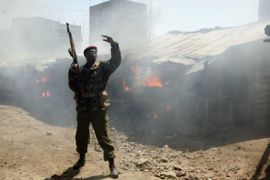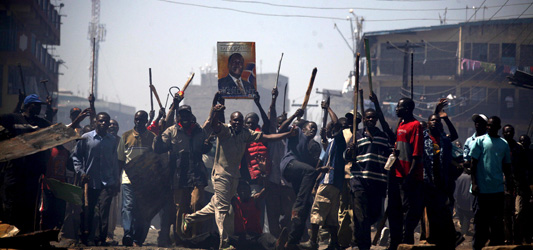Chaos rages in Kenya
Election chief not sure who won polls as government and opposition trade charges over riots.

 |
| Kenya witnessed rioting after the disputed presidential election [EPA] |
Government and opposition politicians in Kenya have blamed each other for inciting the violence that has now killed more than 300 people and displaced tens of thousands following the country’s disputed election.
The government of Mwai Kibaki, the president, accused the party of rival Raila Odinga of “genocide and ethnic cleansing” while the opposition demanded outside mediation to solve the standoff.
“It is becoming clear that these well-organised acts of genocide and ethnic-cleansing were well-planned, financed and rehearsed by Orange Democratic Movement leaders prior to the general elections,” Kivutha Kibwana, the lands minister, said reading a statement on behalf of his colleagues.
Odinga’s supporters, drawn mainly from his Luo tribe, have blamed the violence on Kibaki. Odinga has accused Kibaki of provoking citizens by “stealing” a presidential vote held on December 27.
International observers said the election fell short of democratic standards and both sides have accused each other of electoral fraud.
Relative calm did return to the streets of some parts of Nairobi, the Kenyan capital, on Wednesday, but there are fears of further violence as Odinga’s party plans to hold a mass rally on Thursday despite the government attempting to ban it citing security concerns.
‘Uncertain victory’
Odinga’s claim that Kibaki stole the vote gained further credence on Wednesday when the head of the country’s election commission admitted he was not entirely sure who the victor was.
“I do not know,” Samuel Kivuitu, who pronounced Kibaki the winner on Sunday, said on being asked if he was certain that Kibaki had won fairly.
Kivuitu earlier said all sides pressed him to release the result hastily.
Kibaki, meanwhile, invited all members of the new opposition-dominated parliament to a meeting at the State House in Nairobi.
However, opposition MPs boycotted the session, with Odinga demanding outside mediation.
 |
| At least 70,000 people have been displaced by the violence in western Kenya [AFP] |
“We cannot dialogue with a thief,” Odinga told reporters. “We are not interested in talking with Kibaki without international mediation.”
Ahmad Tejan Kabbah, the former president of Sierra Leone who is attempting mediation, suggested that one solution to the crisis could be a government of national unity.
“Maybe one way to do that [restore calm] would be to argue for a possible all-embracing government,” he told Al Jazeera.
“So you will have national cohesion from there and on that basis you build confidence in the judicial system and move on from there.”
Kibaki’s Kikuyu tribe was immediately targeted in the post-poll violence, but revenge killings by Kikuyus are on the rise.
David Miliband, the British foreign minister, and Condoleezza Rice, the US secretary of state, issued a joint statement calling for an end to violence and “an intensive political and legal process” to end the crisis”.
Andrew Simmons, Al Jazeera’s correspondent in Nairobi, said there was now a relative calm in Nairobi and there were hopes of political movement.
“There is immense international pressure on Kenya,” he said. “From the UK, the US and the EU but also from neighbouring African states who are reliant on the road transports of food and other form of aids coming from the port of Mombasa.”